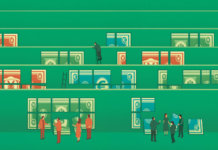Interview with Dr. Claire Seaman, Reader in Enterprise and Family Business
In Scotland, SMEs account for 99.3% of all private sector enterprises and 63% of those are family businesses. This year, after close collaboration with the Edinburgh business community, Queen Margaret University’s (QMU) is launching two postgraduate degrees in family business in recognition of the importance of family-run companies.
Dr. Claire Seaman is a Reader in Enterprise and Family Business at QMU. She has published over 30 journal articles on family businesses in the UK, New Zealand and Latin America and is a regular contributor to family business conferences worldwide. She recently wrote her first book, The Modern Family Business (published by Palgrave McMillan). Dr. Seaman spoke to Tharawat Magazine about the University’s interest in family enterprises, the main research streams and the challenges faced by Scottish family businesses.
What got you into the area of family business?
I used to work in agricultural research, and then with small and micro-businesses, which meant spending a lot of time on farms which are mostly run by families. Also a business in my family was sold and I had the opportunity to see how the process worked. It was interesting to watch the family dynamics.
Through my research into SMEs, I started looking at how families in business interacted with their networks and how they used their social capital.
Listening to their stories I realised how much the family factor really mattered. So we decided to include the family business topic into the curriculum for our students.
What will these new degrees include?
We have a general division focusing on Business, Enterprise & Management, which forms part of our Arts, Social Science and Management faculty. Within that we have created a Family and Smaller Enterprises research group. That group liaises with colleagues leading Masters and undergraduate programmes. We have an MBA (Masters in Business Administration) with a focus on family business and practical experience. We also have an MSc (Masters in Science) with a core of International Management and Leadership which includes family business modules.
Who are these degrees for?
The MSc (Masters in Science) is specifically designed for people who are coming back into a family business with a degree in another discipline. The students will get applied business learning from their courses by interacting with real businesses. The primary focus of our programs is next-generation family business members. We also think that some business advisors might be interested. Of course, we encourage students from all over the world because it brings a range of perspectives to the classroom. We have currently students from India, Nepal, Singapore, USA, Canada and elsewhere.
What kind of family business research is being conducted in QMU?
To me one of the delights of an academic job is that you have great freedom to explore things. We are pursuing a few different streams.
We have some work looking at how knowledge is contained within networks and sharing cultures. We’re looking at a variety of communities; for instance, we’re studying Asian communities and their businesses in Scotland. We have other colleagues focused on Latin American business owners.
We’re looking at behavioural finance: how families take financial decisions together – that’s particularly relevant to families and partners who work closely together. We’re also studying rural family businesses; there are quite large areas of rural Scotland that are very dependent on family businesses and family entrepreneurship often forms the economic bedrock of those communities.
We’re also researching family businesses internationally. We encourage interaction with family businesses in the community and beyond to inspire the research.

[ms-protect-content id=”4069,4129″]
What challenges are Scottish family businesses facing?
Many of Scotland’s biggest, most prominent businesses are family-owned. We also have quite a variety of small and micro businesses, particularly in rural areas. They are all doing a wonderful job but face very similar challenges along the lines of succession, governance, and growth.
Foremost in their minds is probably the potential for export. Scotland represents a strong brand internationally and there’s a distinct range of products we’re famous for. There’s a considerable export market but it is not always easy for families penetrate it.
We need more research and we need better better data. Many of our best examples are bigger businesses because they’re more visible but we need to increase our SME research.
How can family businesses in the community benefit from QMU’s research?
We reach out to the community in three ways. First there’s the Masters-level learning and degrees.
Secondly, there are public events and lectures. We have been fortunate in working with Family Business United – a global family business resource – and the Family Business Association of Scotland. They’ve been great partners. Their educational events give us a fabulous platform to invite businesses onto campus to see what we do, get to know us better, learn from the academic community and see how the community relates to academia.
Finally, students undertake individual project work with family businesses. These projects focus on how collaboration between business and academia can produce innovative products or services. This benefits both parties: passing our expertise to the businesses and helping us contextualize our research and make it real.
Will Scottish family businesses be able to react in a timely fashion to the fast-changing global economy?
As with any business community, there’s a spectrum and different members of that community will have very different priorities. But I think the thing I did notice about working with family businesses in Scotland is that when things are challenging – and things are very challenging at present – family businesses have an extra dimension that they can draw on. They embrace innovation by being open to the exchange between generations. The younger members inform older members about new technologies and the older generation can bring the experience to bear on how to survive crises and change. They have an additional resource.
What does the future of QMU’s family business focus look like?
I’d like to see a well-established cohort in family business, which not only runs as an education program but also a network forming beyond QMU. So when our graduates leave us, they go back to the family businesses and keep in touch with us and with each other. Also, I’d like to see more family businesses in Scotland gain the visibility they richly deserve.
Tharawat Magazine, Issue 30, 2016
[/ms-protect-content]














